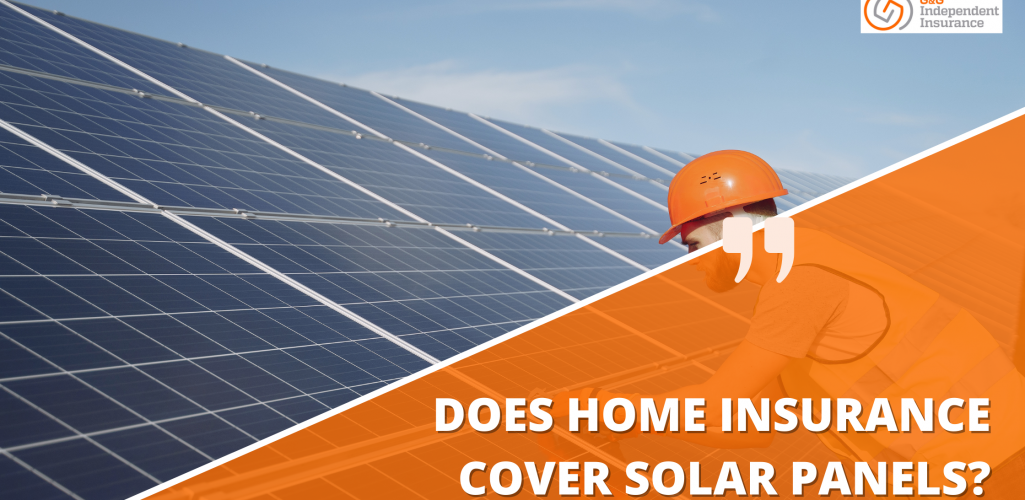Ah, there’s nothing like the feeling of sunshine on your face. Have you ever wondered, “Hmm, how could I bottle this up and use it?”? Well, you’re not alone! According to the Solar Energy Industries Association (SEIA), 784,000 other U.S. households and businesses have installed solar technology since 2015.
And it’s not hard to see why. It’s a great way to offset your reliance on other energy sources and reduce your carbon footprint. Also, they save you a lot of money on your energy over time and some areas even allow you to sell additional power generated back to your utility company.
While it has its benefits, it can be a daunting investment to make as it is a higher cost up-front compared to other energy sources. One way to tackle the concerns around solar panels is to make sure you’re properly protecting your new asset. And the best place to start is through insurance. We’re here to help and we’ll tackle common questions on insurance solar panels!

Does homeowners insurance cover solar panels?
There are a couple of different ways that your solar panels could be covered by your current home insurance policy. If the solar panels are attached to your home’s structure, such as rooftop-mounted panels, your home insurance policy may include them in your dwelling coverage. Two, if the solar panels aren’t attached to your home and are ground-mounted, they may be covered under your other structures’ coverage.
Potential watch out not all policies cover solar panel damage caused by wind and hail, so be sure to review your policy details with your insurance advisor to understand what is covered and what is not.
Solar panels are a great option for an investment, but we recommend double-checking your policy before installing them to protect your investment.
When would I need a separate insurance policy for solar panels?
There may be some scenarios where you’d need a separate policy for your panels. If your solar panels are ground-mounted or on a carport, an insurance endorsement may be the best fit for you. Solar panels that aren’t permanently attached to the home can be prone to more damage, so your insurance company may require you to purchase additional coverage. Review your policy with your insurance advisor to confirm the best insurance deal for your situation.
How much coverage do I have?
If your solar panels are protected under your home insurance, you want to take a look at your coverage limits. Your limit is the maximum amount that would be paid out to you in the event of a covered loss. Also, don’t forget about your deductible! You will likely need to pay it before any other insurance is paid out to help cover a claim.
Pro Tip: Installing solar panels costs typically $15,000 to $25,000, according to the Center for Sustainable Energy. If you live somewhere that is known for severe weather, we recommend raising your coverage limits to make sure your panels are fully protected.
Solar panels can be a big financial undertaking, which is why we highly recommend you review your policy to ensure you have the right coverage amount to help pay for a loss or repairs should an issue arise. Not sure what your coverage limits should be? We’d love to talk with you and go over your policy with you!
What damage to my solar panels is covered by my home insurance?
Your policy can cover your solar panels from all the same perils as your home. For example, let’s say a fire demolished your home or a tornado damages your roof, you’d be able to replace your solar panels under your home insurance policy. However, if your coverage limits do not include your new solar panels, you may be under-insured. Take a look at your policy to determine if you have enough coverage to protect all of your assets in the event of a loss.
Will solar panels increase my homeowners’ insurance cost?
Installing solar panels doesn’t necessarily raise your home insurance premium. However, you will potentially need to increase your limits to account for how much it would take to replace them in the event of a loss. When you raise your limits, you will likely see an increase in cost to cover the higher coverage amount. The change in cost should be minor compared to the increased risk, especially when you factor in where the solar panels are located. Since they are located outdoors and are susceptible to wind, hail, and lightning, they can be at a higher risk of damage.
What else should I consider for solar panels?
The NREL recommends you check with any of your city ordinances or homeowners associations on any requirements or restrictions for solar energy. You’ll also want to make sure you are up to date with any permits or municipality codes that are required.
It may be a big investment to take on, but if you cover your bases and ensure they’re properly protected, solar-generated energy can bring you many wonderful benefits!
Have questions about how solar panels could affect your insurance coverage? Our experts are here to help! Contact us today to review your policy and ensure you’re fully protected.


